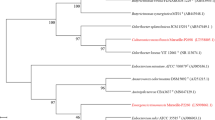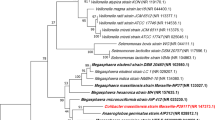Abstract
FOR some time it has been known that the organism widely used for the assay of amino-acids and called Leuconostoc mesenteroides P.60 is not in fact a Leuconostoc. McCleskey1 examinedP.60 and suggested that it might be Streptococcus equinus. However, the culture was atypical mainly because it produced ammonia and carbon dioxide from peptone. McCleskey suggested that the culture should be known as Streptococcus spp.
This is a preview of subscription content, access via your institution
Access options
Subscribe to this journal
Receive 51 print issues and online access
$199.00 per year
only $3.90 per issue
Buy this article
- Purchase on Springer Link
- Instant access to full article PDF
Prices may be subject to local taxes which are calculated during checkout
Similar content being viewed by others
References
McCleskey, C. S., J. Bact., 64, 140 (1952).
Nat. Inst. Res. Dairying, Ann. Rep.(1957).
Gutekunst, R. R., Delwiche, E. A., and Seeley, H. W., J. Bact., 74, 693 (1957).
Felton, E. A., and Niven, C. F., J. Bact., 65, 482 (1953).
Günther, H. L. I. G., Ph.D. thesis, London University (1958).
Author information
Authors and Affiliations
Rights and permissions
About this article
Cite this article
GARVIE, E. Reclassification of Leuconostoc mesenteroides P.60 as a Pediococcus . Nature 183, 1411–1412 (1959). https://doi.org/10.1038/1831411a0
Issue Date:
DOI: https://doi.org/10.1038/1831411a0
This article is cited by
Comments
By submitting a comment you agree to abide by our Terms and Community Guidelines. If you find something abusive or that does not comply with our terms or guidelines please flag it as inappropriate.



